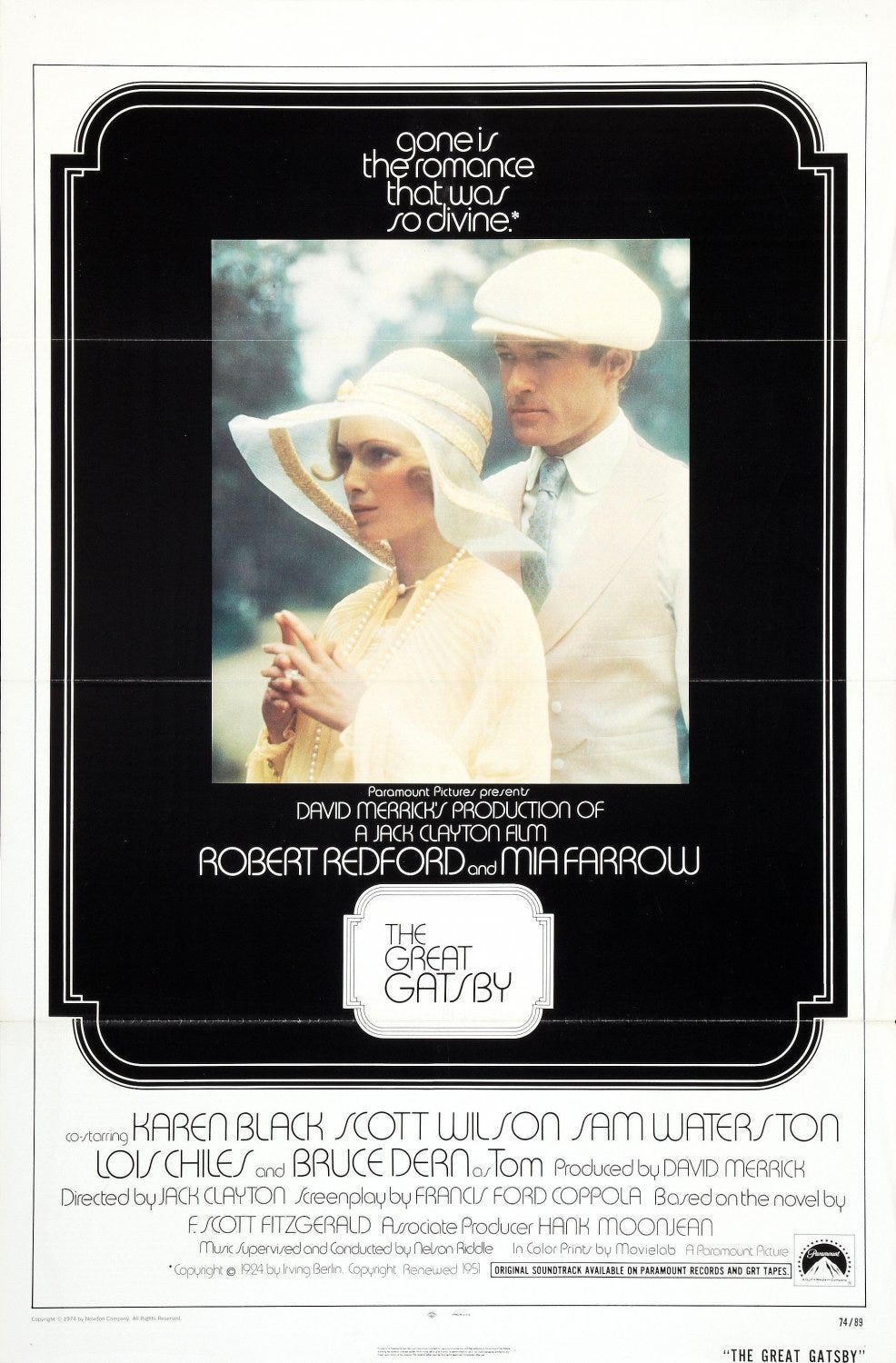Cinematic Despair, Old Sport
As Sundance gets under way, a look back at Robert Redford in 'The Great Gatsby.'
Now Streaming: What were they thinking?
"My wedding gift to her was Daisy Buchanan," writes Robert Evans in The Kid Stays in the Picture, his uber-gossipy autobiographical memoir, first published in 1974. He is referring to Ali MacGraw, his then-new wife, who he claims was dying to play Daisy Buchanan in a new film version of F. Scott Fitzgerald's The Great Gatsby. Knowing this, the actor turned production chief of Paramount Pictures obtained the rights to the famed novel, which had twice before (in 1926 and 1949) been made into a motion picture, and hired Truman Capote to write the screenplay.
Evans says that Robert Redford was among those in Hollywood at the time who wanted to make a new version. But it was Evans who obtained the rights, hired Capote, who then turned in a script that Evans called "a miscarriage." Anticipating the delays to come, Evans strongly encouraged MacGraw to go make The Getaway with Steve McQueen on location; McQueen and MacGraw fell in love, which ended Evans' marriage and, needless to say, any prospect that Ali MacGraw might portray Daisy Buchanan.
Robert Towne declined an opportunity to write the screenplay, instead writing his own original script, Chinatown. Francis Ford Coppola, coming off his Academy Award for The Godfather, agreed to the job and "delivered a screenplay that really worked," according to Evans. British director Jack Clayton was engaged to helm the picture and Mia Farrow was selected to play Daisy Buchanan.
Robert Redford stars as the cool, aloof, and mysterious Jay Gatsby, first seen by Nick Carraway (Sam Waterston) in silent repose as the sun sets. Young Nick, hailing from a very modest background, is spending the summer in a small cottage that is next door to Gatsby's elegantly-appointed and absolutely massive mansion on Long Island during the early 1920s. Nick's distant cousin Daisy is newly-married to Tom Buchanan (Bruce Dern), who is carrying on an affair with Myrtle Wilson (Karen Black), whose husband (Scott Wilson) runs the local gas station. Nick is paired with Daisy's best friend, Jordan Baker (Lois Chiles), but the two never hit it off romantically.
Unrequited love swarms around each of the characters as they bump and collide and crash and burn among the sumptuous surroundings, which are rendered in a glossy manner, like vaseline has smeared every camera lens, by director of photography Douglas Slocombe, an Academy Award nominee the previous year for Travels With My Aunt. Director Jack Clayton, who helmed Room at the Top and The Innocents years before, made his only film in the 1970s with The Great Gatsby, which looks like a motion picture, but plays like required reading, a stuffy book to check off on a list of the '50 Best Novels.
Fitzgerald was capable of writing elegantly and hauntingly; as critic John Simon noted about the novel in his review, originally published in July 1974: "It is a work of art because of its style, and there is no way in which a written style can be turned into a cinematic one. … To a short, sleek novel like Gatsby … nothing could be more destructive than slow pace, top-heavy lavishness, and over explicitness. Under these impositions, the film version sinks to the bottom." (Review collected in Simon's book Reverse Angle: A Decade of American Films.)
Though I've seen the film before, I watched it again to see if my distant memories remain accurate. Initially I was distracted by the film's visual beauty, as I was watching it in HD for the first time, but those distractions soon melted away as the film lumbered along through its designated narrative stops.
Today, the casting decisions seem all wrong; Redford (coming off The Way We Were and The Sting) and Farrow (coming off a string of forgettable films) cannot muster up any sparks between them, which dooms the romantic angle. Bruce Dern and Karen Black appear to have stopped by on their way to better pictures: Dern would next make the great Smile, while Black overcame two more missteps before scoring with Day of the Locust and Nashville.
Looking back, it's difficult to see the appeal of the film as anything other than an attempt to trade on the nostalgia boom of that period of the 1970s. As I recall, in those years, the past held great appeal for younger people -- like me -- and adults who liked to remember gentler times. The majority of the filmgoing audience, though, even then in their late teens and early-to-mid twenties, was more interested in films that showed them something they hadn't seen before; they weren't ready to luxuriate in memories from distant days before they were born.
Period movies that displayed a modern sensibility and a rebellious and/or independent streak were much more in tune, as I recall. That left The Great Gatsby stranded on its own long island of cinematic despair.
Since a certain annual event will get underway this week, I wonder: was Robert Redford inspired by his experience on this picture to get involved with the U.S. Film and Video Festival some ten years later? The event was later renamed the Sundance Film Festival.
As a final aside, it's notable that Patsy Kensit appears as the daughter of Tom and Daisy Buchanan; she would later star opposite Mel Gibson in Lethal Weapon 2 and fashion quite a respectable career. [HBO Max]


